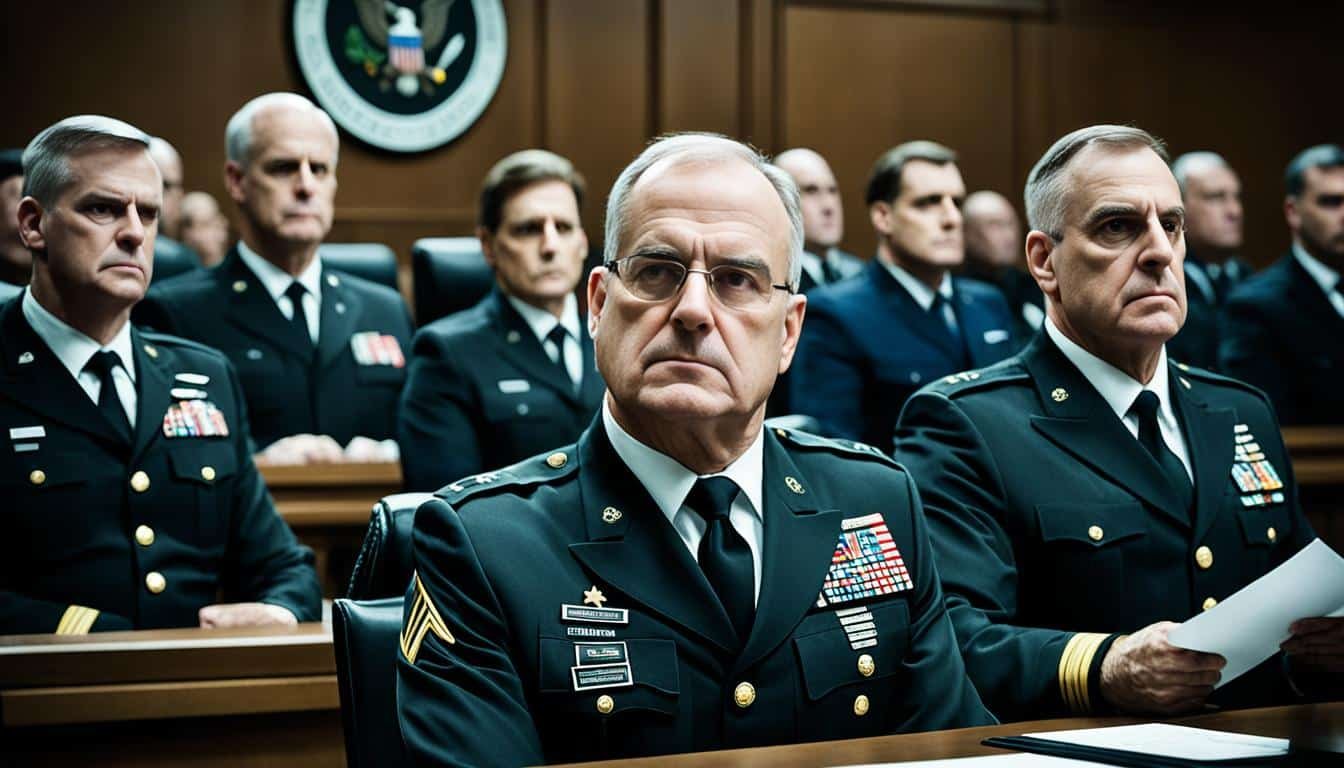Military law is a distinct body of law that governs the members of the armed forces in the United States. It functions as a system of government for military members and is different from martial law. The usage of military law on the members of the armed forces was a recognition that military individuals are subjected to different rules and expectations than ordinary civilian citizens.
The military legal system is codified in the Uniform Code of Military Justice (UCMJ), which applies to all branches of the military, including activated reservists, active duty personnel, guard members, and even retired members. All members within the scope of the military fall under the jurisdiction of military law regardless of whether they are actually in service or not. The UCMJ covers offenses specific to military officials as well as ordinary civilian crimes, but has a different standard of proof than civilian courts and a different set of punishments.
Key Takeaways
- Military law is a distinct legal system that governs the members of the U.S. armed forces.
- The Uniform Code of Military Justice (UCMJ) serves as the foundation for the military justice system.
- The UCMJ covers both military-specific offenses and ordinary civilian crimes committed by service members.
- Military law has a different standard of proof and set of punishments compared to the civilian legal system.
- All members within the scope of the military, including reservists, active duty personnel, and retirees, fall under the jurisdiction of military law.
Military Law: An Overview
Military law is a distinct legal system that governs the members of the United States armed forces, including active duty personnel, reservists, and even retired members. This specialized body of law functions as a system of government for military members and is different from martial law, which is the imposition of direct military control over civilian affairs.
Definition and Purpose
At its core, military law is designed to maintain discipline, order, and readiness within the military. It covers a range of offenses specific to military officials as well as ordinary civilian crimes committed by service members, with a different standard of proof and set of punishments compared to civilian courts.
Constitutional Basis
The constitutional basis for military law in the United States is found in the authority granted to Congress by the Constitution to “make rules for the government and regulation of the land and naval forces.” This empowers the legislative branch to establish a distinct legal system applicable to members of the armed forces.
Scope and Applicability
According to the Uniform Code of Military Justice (UCMJ), all persons serving in the Armed Forces of the United States are subject to military law at all times, regardless of whether they are actually in active service or not. The UCMJ applies to all branches of the military, including activated reservists, active duty personnel, guard members, and even retired members.
Uniform Code of Military Justice (UCMJ)
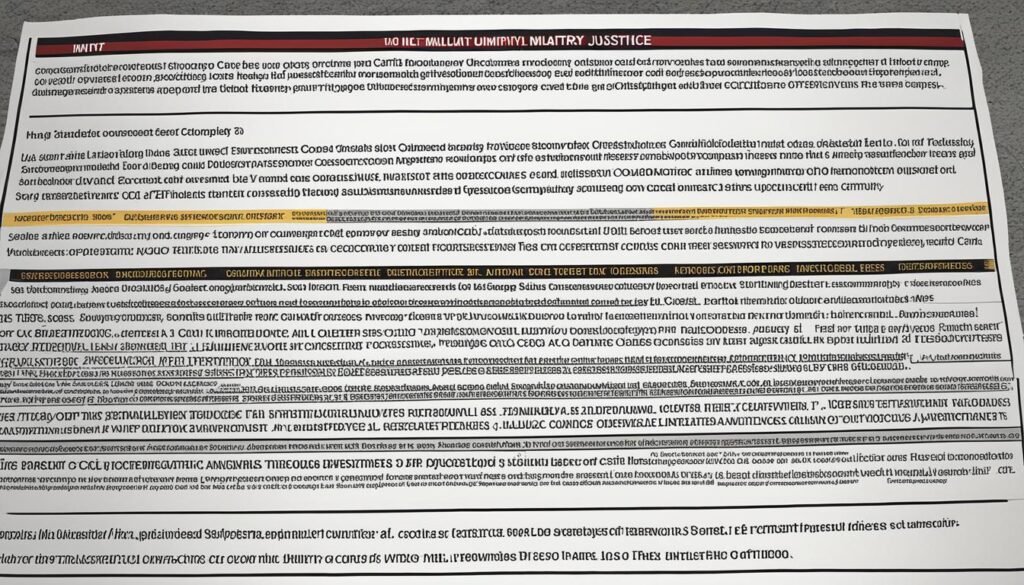
The Uniform Code of Military Justice (UCMJ) has deep roots in the history of the United States, tracing its origins to the very foundations of the nation’s military justice system. The UCMJ’s origins can be traced back to the United States Constitution, which authorized Congress to “make rules for the government and regulation of the land and naval forces.”
Origins and Evolution
In 1806, Congress issued a new set of rules known as the Articles of War, which served as the primary framework for military law in the United States. These Articles of War were later superseded by the 1863 Lieber Code during the American Civil War, which provided a more comprehensive set of guidelines for the conduct of warfare and the treatment of prisoners.
Finally, in the aftermath of World War II, Congress enacted the Uniform Code of Military Justice in 1951. This landmark legislation consolidated and modernized the various military laws and regulations into a single, comprehensive code of military justice, which is now federal law located in Title 10 of the United States Code, Chapter 47.
Structure and Content
The UCMJ serves as the foundation for the military justice system, covering a wide range of offenses and providing a framework for the investigation, prosecution, and punishment of military personnel. It includes both military-specific crimes, such as dereliction of duty and failure to obey orders, as well as civilian crimes that can be committed by service members, such as theft and assault.
The UCMJ’s structure and content ensure that the unique nature of military service is reflected in the justice system, while still maintaining Due Process and other fundamental legal protections for those subject to its jurisdiction. This comprehensive code of military law plays a crucial role in maintaining discipline, order, and good order and discipline within the U.S. armed forces.
Military Justice System
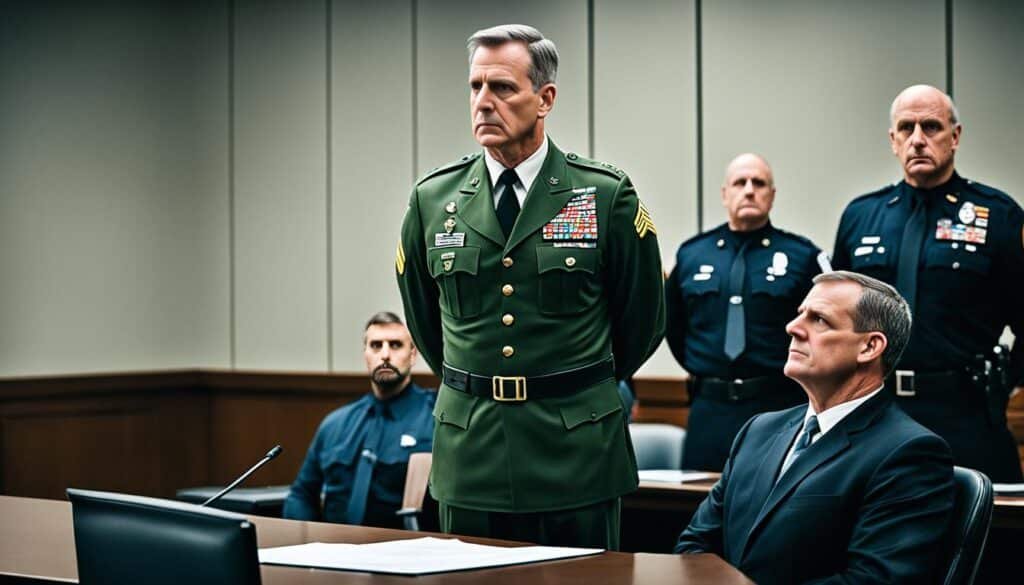
When a military member commits an offense, the member’s immediate commander is usually responsible for determining how the offense should be charged. For more serious offenses, military or security police investigators have the authority to investigate and charge, while criminal investigative agencies handle the most serious offenses. Commanders have the option to take no action, take administrative action, use nonjudicial punishment, or try the offender by court-martial.
Court-Martial Process
Judge advocates typically prosecute and defend the accused in court-martial proceedings, which are governed by the Uniform Code of Military Justice (UCMJ). The court-martial process provides a structured system for adjudicating alleged military law violations and ensuring due process for service members.
Punishments and Penalties
The UCMJ outlines a range of punishments under military law, including fines, demotions, confinement, and even court-martial convictions that can lead to penalties in the military justice system. The severity of the punishment depends on the nature and circumstances of the offense, as well as the decision of the commanding officer or court-martial.
Appeals and Review
A court-martial conviction can be appealed through the military courts, including the United States Court of Appeals of the Armed Forces (USCAAF), a federal appellate court. Decisions from the CAAF can be subjected to direct review by the United States Supreme Court, providing an additional layer of military justice appeals process and oversight.
| Key Aspect | Description |
|---|---|
| Military Court Martial Process | A structured system for adjudicating alleged military law violations, ensuring due process for service members. |
| Punishments Under Military Law | Includes fines, demotions, confinement, and court-martial convictions leading to penalties in the military justice system. |
| Military Justice Appeals Process | Allows for appeals through military courts and the possibility of review by the U.S. Supreme Court. |
Offenses and Crimes under Military Law
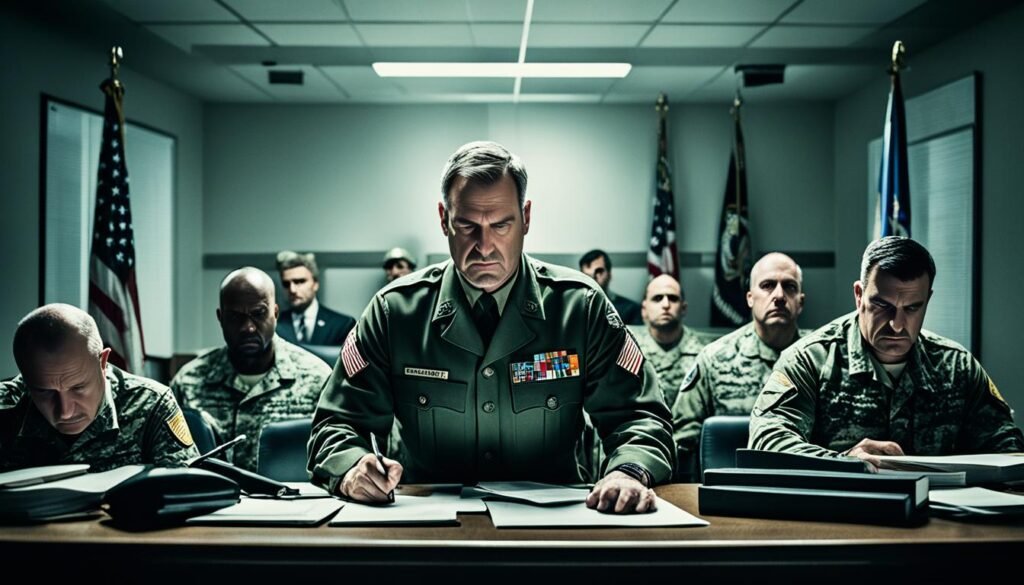
The Uniform Code of Military Justice (UCMJ) covers a wide range of military specific offenses as well as civilian crimes under military law. These ucmj offenses and crimes covered by military law encompass a diverse array of types of offenses under military law , including both military law criminal offenses and civilian crimes committed by military members.
Military-Specific Offenses
The UCMJ outlines a number of offenses that are specific to the military context, such as high crimes and misdemeanors, perjury of oath, abuse of authority, bribery, intimidation, misuse of assets, failure to supervise, and dereliction of duty. These military specific offenses reflect the unique responsibilities and expectations placed on military personnel and military members serving in the armed forces.
Civilian Crimes in Military Context
In addition to military-specific offenses, the UCMJ also covers civilian crimes under military law. While these crimes covered by military law may be similar to civilian offenses, they are subject to a different standard of proof and a distinct set of military law criminal offenses and punishments. All military personnel and military members, including those who commit crimes unrelated to military matters, are subject to the UCMJ in addition to any applicable civilian penalties.
| Military-Specific Offenses | Civilian Crimes under Military Law |
|---|---|
| High crimes and misdemeanors | Assault |
| Perjury of oath | Theft |
| Abuse of authority | Fraud |
| Bribery | Drug offenses |
| Intimidation | Drunk driving |
| Misuse of assets | Domestic violence |
| Failure to supervise | Vandalism |
| Dereliction of duty | Disorderly conduct |
The table above provides a comparison of some military specific offenses and civilian crimes under military law that are covered by the UCMJ. This comprehensive legal framework ensures that military personnel and military members are held accountable for a wide range of crimes covered by military law, both within the unique military context and in relation to civilian crimes committed by military members.
Jurisdiction and Authority

When a military member commits an offense, their immediate commanding officer is typically responsible for determining how the offense should be charged. For more serious infractions, military police investigators and security police investigators have the authority to investigate and file charges, while criminal investigative agencies handle the most serious offenses. The commanding officer has the discretion to take no action, pursue administrative action, utilize nonjudicial punishment, or initiate a court-martial trial for the offender.
Commanding Officers’ Role
Commanding officers play a pivotal role in the military law jurisdiction and the enforcement of military law. They possess the authority to determine the appropriate course of action when a service member under their command commits an offense, ranging from administrative measures to formal court-martial proceedings. This critical decision-making power ensures who has authority in military law and how the role of commanding officers in military law is executed.
Military Police and Investigators
For more serious offenses, the military police and security police investigators are granted the authority to investigate and charge service members. These specialized law enforcement entities within the military legal system work alongside criminal investigative agencies to handle the most severe infractions, ensuring the role of military police in military law and who enforces military law effectively.
Military Law
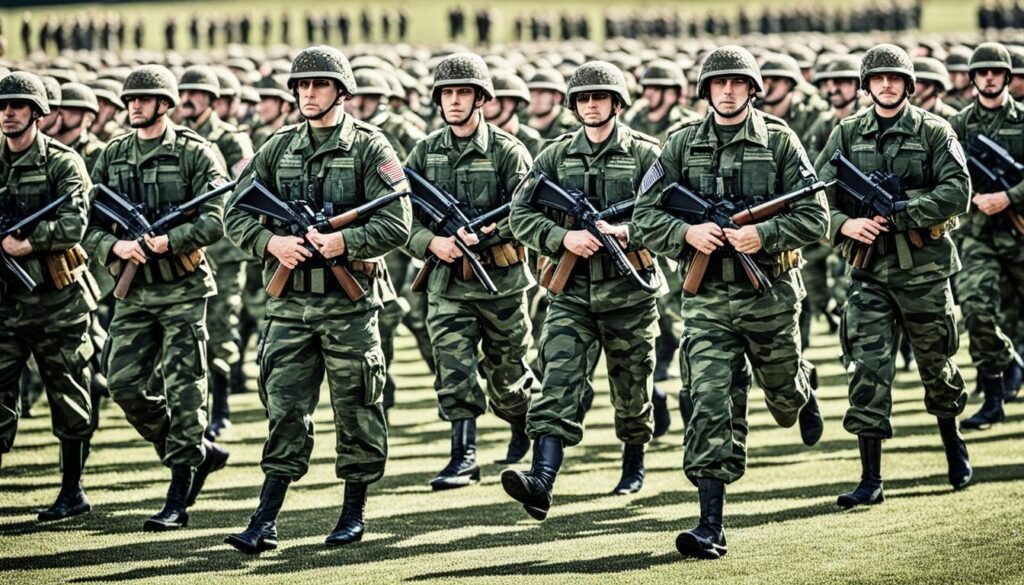
While military law is part of the broader legal framework and is recognized by civil courts, it is a distinct system of justice that applies specifically to members of the armed forces. Military law differs from civilian law in several unique aspects, as it operates in times of both peace and war to maintain discipline and order within the military.
Unique Aspects
The Uniform Code of Military Justice (UCMJ) is the foundation of the military justice system, containing a comprehensive set of crimes and offenses, as well as rules for trials and sentencing. This level of detail and specificity is unique to the military legal system, reflecting the specialized nature of the armed forces and the need for strict discipline.
Additionally, military law has a different standard of proof and a separate set of punishments compared to civilian courts. Service members can face consequences such as court-martial, demotion, and even incarceration for offenses that may not be considered crimes in the civilian world.
Similarities to Civilian Law
While military law has its own distinct features, there are also similarities between military law and civilian law. Both systems aim to uphold justice, protect rights, and maintain order. Service members, like their civilian counterparts, are afforded certain legal protections, such as due process and the right to legal counsel.
Furthermore, many civilian crimes, such as assault, theft, and drug offenses, are also covered under military law. However, the military justice system may handle these cases differently, taking into account the unique circumstances and context of the military environment.
Legal Rights and Protections
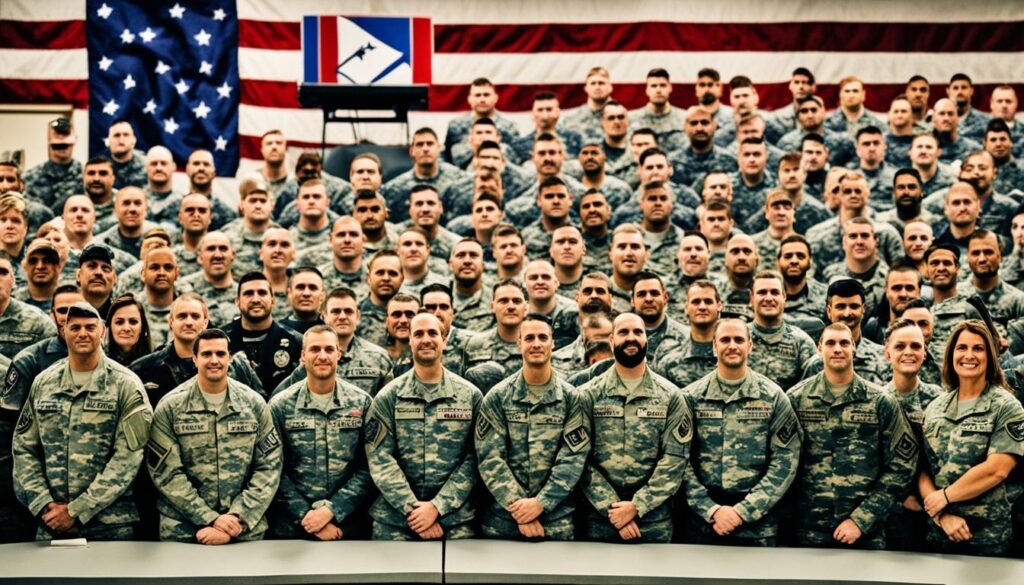
While military law is distinct from civilian law,
service members still maintain certain legal rights and protections. The Department of Justice’s Servicemember’s Rights Center provides information on how the government can help service members and what they can do to protect their rights under the law. Additionally, the Uniform Code of Military Justice (UCMJ) and the military justice system aim to provide due process for service members, including the right to legal counsel.
Due Process in Military Courts
The military justice system is designed to ensure that service members receive fair and impartial trials. Judge advocates usually prosecute and defend the accused in courts-martial, which are the military’s version of civilian criminal trials. The UCMJ outlines the procedures and safeguards in place to protect the rights of service members, such as the right to be presumed innocent until proven guilty, the right to confront witnesses, and the right to appeal a conviction.
Legal Assistance for Service Members
In addition to the protections provided by the UCMJ, service members also have access to various legal resources and assistance programs. These include on-base legal offices, where military legal aid is available to help with a wide range of legal matters, from drafting wills and contracts to representing service members in courts-martial and other legal proceedings. The goal is to ensure that military members have the necessary legal representation and support to navigate the complexities of military law and protect their rights.
International Implications
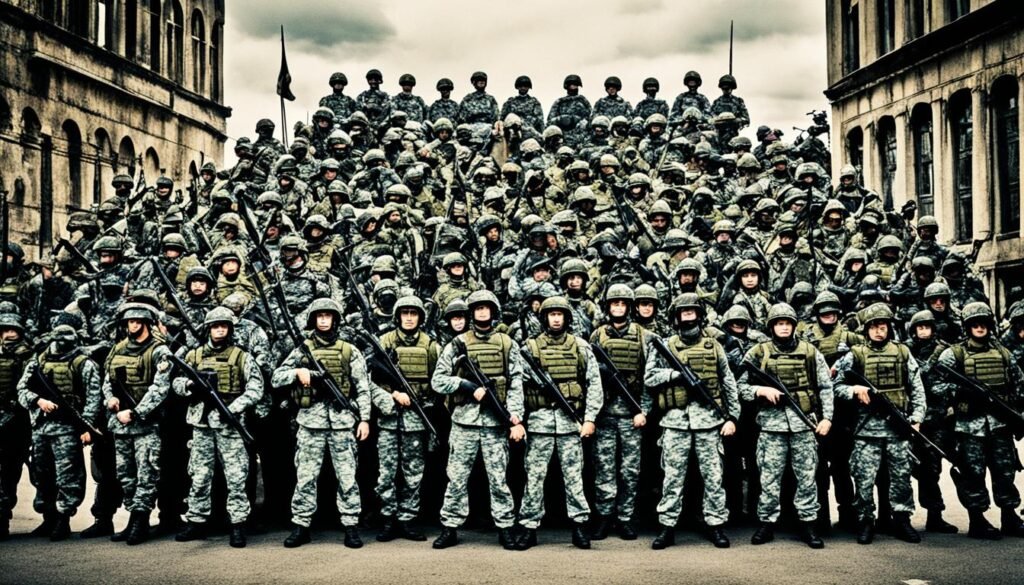
As a federal law in the United States, the Uniform Code of Military Justice (UCMJ) and the broader military legal framework have significant international implications. The extraterritorial application of military law means that service members stationed or deployed in foreign countries remain subject to the UCMJ, even when operating outside the borders of the United States.
Extraterritorial Application
The extraterritorial application of military law can create complex jurisdictional issues and potential conflicts and challenges when U.S. military personnel interact with local legal systems and authorities in host nations. Differences in legal traditions, procedures, and standards of proof between the U.S. military justice system and foreign legal frameworks can lead to complications in the enforcement and adjudication of military offenses committed overseas.
Conflicts and Challenges
The application of military law outside the US and in foreign countries can also give rise to conflicts and challenges related to the international jurisdiction of military law. Issues may arise regarding the boundaries of military law’s jurisdiction overseas and how it interacts with the legal systems of host nations, potentially creating global issues with military law.
Navigating these international implications of military law and how military law applies internationally requires careful coordination and cooperation between the U.S. military, the Department of State, and foreign governments to ensure the fair and effective administration of justice for service members stationed abroad.
Historical Significance
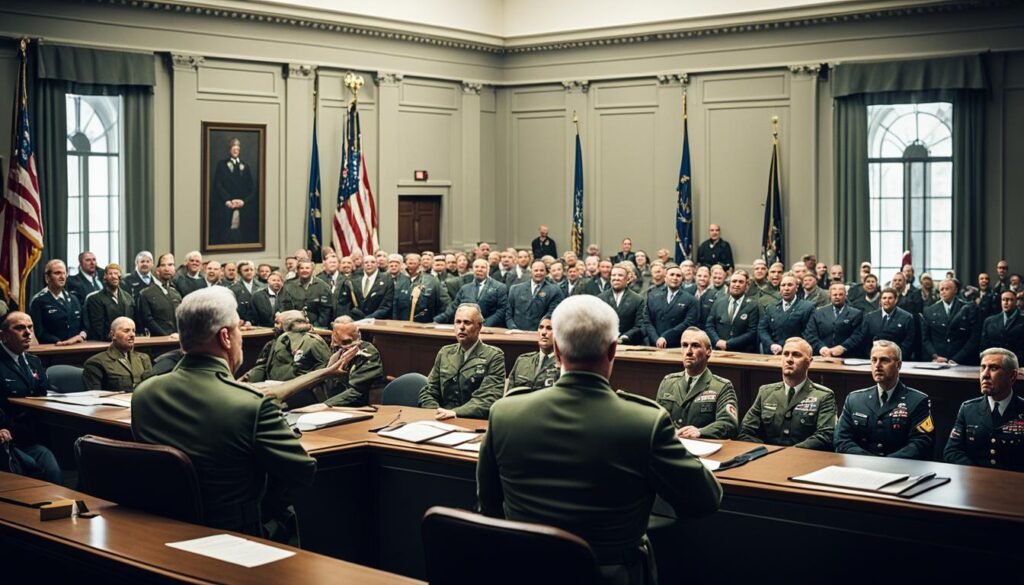
The history of military law in the United States is a rich tapestry, tracing its origins back to the early days of the nation. The evolution of the military justice system has been marked by a series of landmark cases and reforms that have shaped the legal framework governing the armed forces.
Evolution of Military Justice
The roots of military law can be found in the Articles of War enacted by Congress in 1806, which established the initial rules and procedures for the military justice system. During the American Civil War, the Lieber Code further codified the laws of war, laying the groundwork for the modern understanding of military law. However, it wasn’t until the aftermath of World War II that the current Uniform Code of Military Justice (UCMJ) was enacted in 1951, consolidating and modernizing the military justice system.
Landmark Cases and Reforms
Over the decades, landmark cases in military law have played a pivotal role in shaping the legal landscape. From Weiss v. United States, which upheld the constitutionality of the UCMJ, to Solorio v. United States, which expanded the jurisdiction of military courts, these decisions have had far-reaching implications. Additionally, major reforms such as the Military Justice Act of 1983 and the National Defense Authorization Act of 2014 have further refined and strengthened the military justice system, ensuring it remains responsive to the evolving needs of the armed forces.
The historical significance of military law cannot be overstated, as it has continuously adapted to meet the changing demands of national defense and the unique challenges faced by service members. From the foundational principles established in the early 19th century to the landmark cases and reforms of the modern era, the evolution of the military justice system reflects the enduring commitment to upholding the rule of law within the armed forces.
Also Read: What Role Does Corporate Governance Play In Banking And Finance Law?
Conclusion
Military law is a distinct legal system that governs the members of the U.S. armed forces, including active duty personnel, reservists, and even retirees. The Uniform Code of Military Justice (UCMJ) serves as the foundation for the military justice system, covering a range of offenses from military-specific crimes to civilian offenses committed by service members. This system operates alongside the civilian legal framework, with its own courts, investigation procedures, and disciplinary measures.
While sharing some similarities with civilian law, military law also has unique aspects that reflect the specialized nature of the armed forces and the need to maintain discipline and order within the military. Understanding the role and application of military law is crucial for service members, their families, and those interacting with the armed forces, as it governs the rights, obligations, and consequences applicable to those under its jurisdiction.
The importance of military law in the U.S. cannot be overstated, as it plays a vital role in ensuring the effective and disciplined operation of the nation’s armed forces. By providing a comprehensive legal framework tailored to the unique needs of the military, the military justice system helps to uphold the values and principles that are fundamental to the success of the U.S. armed forces both at home and abroad.
FAQs
Q: What is military law?
A: Military law is a body of laws that govern the conduct and behavior of military personnel within the armed forces. It outlines the rules and regulations that military personnel must adhere to while serving in the military.
Q: Who is subject to military law?
A: Military law applies to all individuals who are part of the armed forces, including active-duty personnel, reservists, and those serving in the National Guard.
Q: What are some common offenses under military law?
A: Some common offenses under military law include desertion, insubordination, breaches of discipline, and other actions that violate military regulations and standards of conduct.
Q: How does military law differ from civilian law?
A: Military law is specifically tailored to the unique needs and circumstances of the military, while civilian law is designed to govern the general population. Military law often has its own legal procedures and judicial system separate from civilian courts.
Q: What is the purpose of military law?
A: The purpose of military law is to maintain discipline, order, and effectiveness within the armed forces. It ensures that military personnel adhere to a set of rules and regulations that are essential for the functioning of a military organization.
Q: What are the consequences of violating military law?
A: Violating military law can result in various consequences, including loss of privileges, confinement, discharge from the military (including dishonorable discharge), and other disciplinary sanctions.
Q: How are military laws enforced?
A: Military laws are enforced through military tribunals and judicial processes established by the Uniform Code of Military Justice (UCMJ). Military personnel are subject to the UCMJ and can face legal consequences for infractions.
Source Links
- https://www.law.cornell.edu/wex/military_law
- https://www.law.cornell.edu/wex/military
- https://www.military.com/benefits/military-legal-matters/military-law-overview.html
